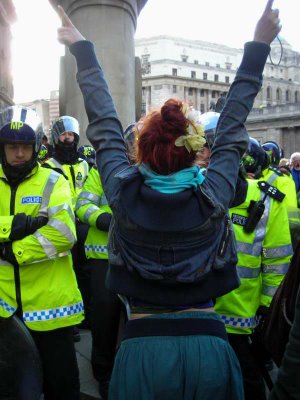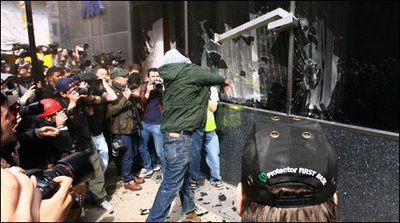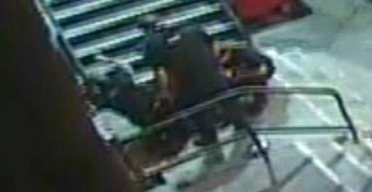Adapting to protest and adapting to the government's position.
Equally, O'Connor's recommendations are difficult to fault. He proposes that the police adopt a fundamental set of principles on the use of force that runs as "a golden thread" through all policing, not just that of protests, based around the minimum use; that public order policing across the board should be codified so that the use of powers, equipment and tactics is consistent; that public order training be improved, especially since individual officers are themselves legally accountable for their actions; that the Association of Chief Police Officers should have its status reviewed, especially considering its role in policy making, most notoriously of late designating legitimate protesters as "domestic extremists"; and probably most significantly, keeping communication open constantly with protesters and the public, especially with protest groups' representatives.
All this is meant, in O'Connor's mind, to ensure that the historic principle of policing by consent, as philosophised and introduced by Robert Peel, does not break down. The obvious problem with this is that while it's difficult to pin down exactly when this compact irrevocably broke when it came to the policing of protests, although the report itself notes that the clashes between the blackshirts and anti-fascists in the 30s were far more significant breakdowns in public order than many of our modern equivalents, irrevocably break down it did long ago. Policing by consent does still exist when it comes to the average bobby on the beat, but when it comes to protests, especially those that occur on the relative spur of the moment and when they concern relative matters of life and death, it's difficult for a good-natured and friendly relationship between protesters and those that are in control of them to exist, and to pretend that it can be maintained is relatively naive. Often on these occasions relative control can still be exercised, but it depends on those who are pushing their luck either being told in no uncertain terms to calm down, or on them being arrested, potentially both for their own good and to ensure that the protest as a whole doesn't embarrass both sides. For all the times when the police are rightly criticised for their actions, sometimes even protesters recognise that those amongst them are just out to cause trouble: this was the case back in January, during the protests in London against the Israeli attack on Gaza. Some of the trouble can be put down to both sides underestimating the numbers who were going to turn out, but also down to the police failure to separate those out who were determined to attack the police or property early enough. As much as protesters loathe the Forward Intelligence Teams that indiscriminately film protests for their own records, some of it is justified, if only so that the idiots can be filtered out to the benefit of both sides.
While O'Connor himself can hardly be blamed for focusing on the present, it's instructive that the policing of protests is only now considered controversial, mainly because of how the internet and modern media has ensured that the police (and indeed, the protesters themselves) can be held to account. After all, it's not as if the police have only suddenly disgraced themselves with how they treat legitimate protests; it's been going on for decades, whether you go back to the 70s marches where the National Front was often favoured against those protesting against them, to the Battle of Orgreave, the poll tax riots, the May Day protests of the 90s and early 00s, right up to the Countryside Alliance protest outside parliament during the pass of the fox hunting bill and more recent examples. It's also not just these more notorious cases, but the other, smaller marches, where outrageous police behaviour has often gone completely unnoticed by the national media. One thing O'Connor fails to address is that often it's been the very officers that are dedicated to control protests that have been amongst the very worst offenders; whether the Special Patrol Group or the modern equivalent the Territorial Support Group, these officers often seem to be selected not because of their powers of mediation, but because of their very obstinacy, quickness to use of force and general disdain for protesters of every hue. It may be that officers drafted in to control large protests aren't trained properly, and as a result of probably being as frightened and as uncertain as the protesters themselves can lash out and act defensively, but it's often those who have been specially trained that are the very worst. A special review of those in these groups and an emphasis on facilitating the right to protest would have been especially welcome as an additional recommendation.
The largest hole in O'Connor's report though has nothing to do with the police themselves; it is the influence of government itself upon the policing of protest. It's easily forgotten that this government has been one of the most ruthless at suppressing protest in living memory, that as well as banning protests within a mile of Westminster without prior permission, it attempted and almost succeeded in banning the biggest protest march in this country of all time, the Feb 15th 2003 anti-Iraq war protest, by claiming that to do so would damage the grass of Hyde Park. More recently it has connived with those being targeted by the likes of Climate Camp, directly handing over intelligence on individuals to the companies running the power stations. The support the government has given to the police, on almost every single thing they have done or been criticised over, has been total. Even Ken Livingstone, hardly a prior fan of the Met, defended Ian Blair and his force to the hilt after the execution of Jean Charles de Menezes. When you give such total, unconditional support, and shrink from criticising anything, you invite them to believe themselves unaccountable. To be fair to New Labour when it doesn't deserve it, it's not that this is new; the Tories did much the same, but not to the same extent. Every single new power which you give to the police is abused, most recently uncovered that the granting of the power of arrest for any offence has resulted in the taking of DNA profiles to continually enlarge the database, almost certainly by stealth and without any debate. Unless the government itself decides that protest as a whole is legitimate, and should be facilitated rather than something which it has to put up with, there's little hope of the police themselves introducing such an enlightened stance.
Labels: adapting to protest, alleged police brutality, civil liberties, Dennis O'Connor, G20 protests, Ian Tomlinson, police, politics




